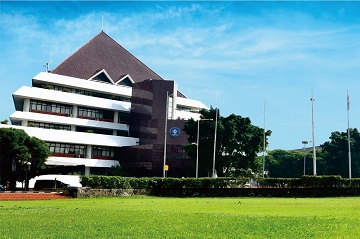The Faculty of Agriculture of IPB Has Been a Source of Inspiration for Programs and Policies of Ministry of Agriculture

The Faculty of Agriculture of Bogor Agricultural University (FAPERTA IPB) is one of the oldest Faculty of Agriculture in Indonesia and has existed since the inauguration of IPB in 1963. IPB was founded on September 1, 1963 by the decision of the Minister of Science and Higher Education No. 92/1963 and was approved by President Sukarno's decree No. 279/1965. At the time, the two faculties of University of Indonesia which is in Bogor were separated into an independent institution. The new university (IPB) has five faculties: Agriculture, Veterinary Medicine, Fisheries, Animal Science, and Forestry. In 1964 the Faculty of Technology and Mechanization of Agriculture was added.
Currently the Faculty of Agriculture has four Departments: Department of Soil Science and Land Resources, Department of Agronomy and Horticulture, Department of Plant Protection, and Department of Landscape Architecture.
The Faculty of Agriculture is the main academic institution of agriculture in Indonesia. The Faculty provides excellent education opportunities and conducts research on agriculture in broader sense. The Faculty of Agriculture has played important roles in producing innovations in agriculture, new varieties, and cultivation technology is considered good by the government. Of course this helps to maintain and improve food sovereignty in Indonesia.
As an agrarian country, the Indonesian agriculture should be developed properly. It is the reason why Bogor Agricultural University (IPB), especially the Faculty of Agriculture actively promotes agricultural modernization by agricultural innovations, one of which is the IPB 3S Demfarm program. The development of IPB 3S rice has been adopted by the government, and the government even provided funding to the Faculty of Agriculture to implement the “Start up rice seed industry for IPB 3S Rice production to support the national food self-sufficiency in Indonesia”.
Production of soybean varieties under saturated soil culture on tidal swamps. Saturated soil culture (SSC) is a cultivation technology that gives continuous irrigation and maintains water depth constantly and makes soil layer in saturated condition. By keeping the water-table constantly, soybean will be avoided from negative effect of inundation on soybean growth because soybean will acclimatize and improve its growth. The Faculty of Agriculture also introduced the Orange Revolution in order to increase the production of fruits in Indonesia, namely small-scale processing operations exploiting the splitting up of a plantation estate.
Since 53 years ago, IPB has grown and developed into a university that has a good reputation and plays an important role in the national development and higher education in Indonesia. The Faculty of Agriculture becomes the place for education, research, and also the reference and consultation place in making and drafting programs and policies for Ministry of Agriculture. The Faculty of Agriculture had initiated the idea of making Indonesia as the world's largest exporter of fruits in the world in 2045. For that, the Faculty of Agriculture intensively conducted a fruit-eating campaign, one of them through the Festival of Flowers and Fruits Nusantara (FBBN) which has been implemented in the last three consecutive years. The government then has adopted it to become Fruit Indonesia 2016.
Some national agencies rank many of he Faculty of Agriculture graduate programs among the best in the nation. Since its creation, the Faculty of Agriculture has contributed significantly to the development of Indonesia by providing qualified human resources in all agricultural fields, such as Ir. Mount Sutopo which is currently focused on developing dragon fruit plants; Late Prof. Dr. Soleh Solahuddin who had served as Minister of Agriculture of the Republic of Indonesia; Sunarso as Deputy Director of Bank BRI; And many other successful figures were produced by this Faculty. The Faculty of Agriculture which is at present located in Jalan Raya Dramaga, Bogor, had just been certified the International Organization for Standardization (ISO) management and ISO laboratories. (Wied)



